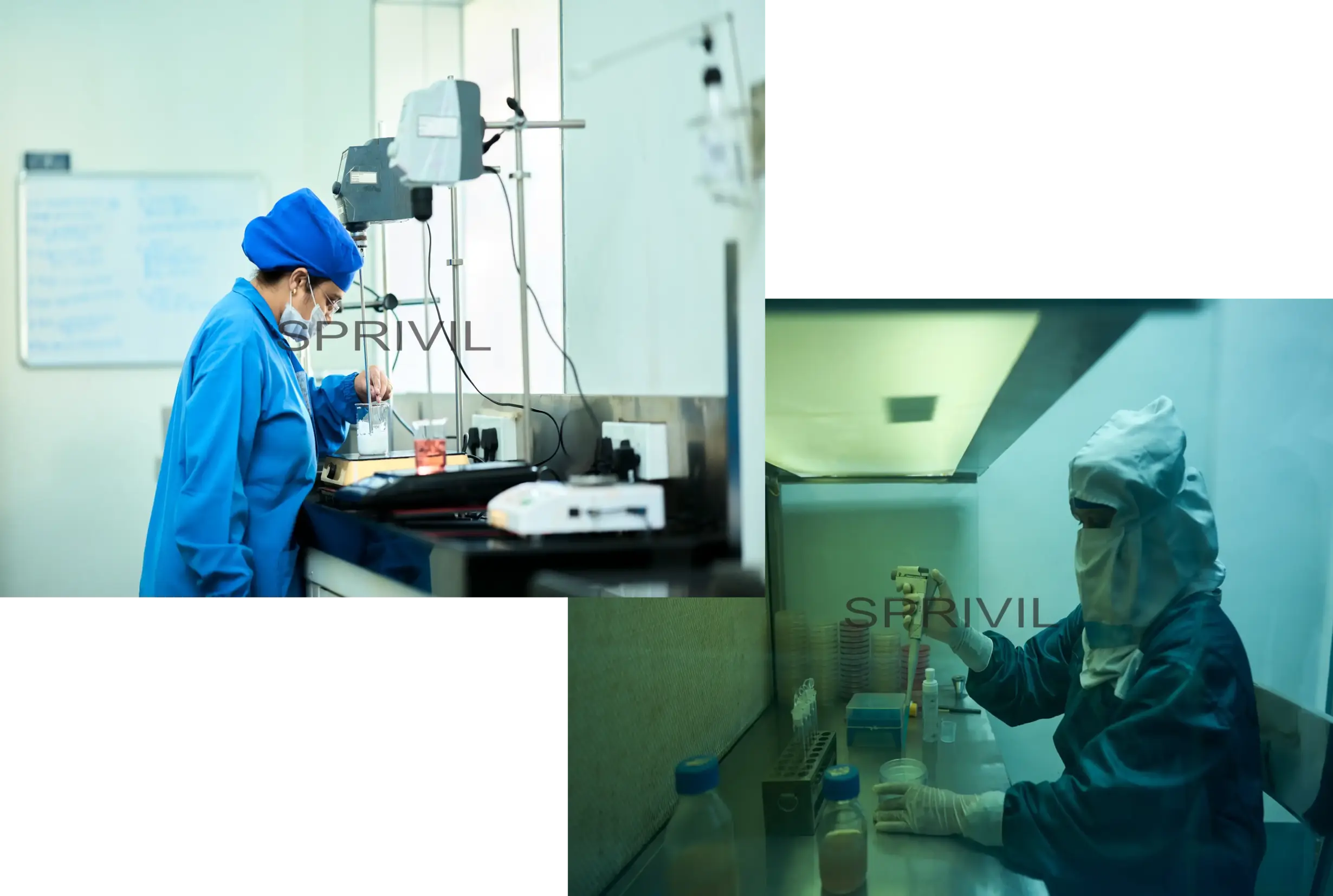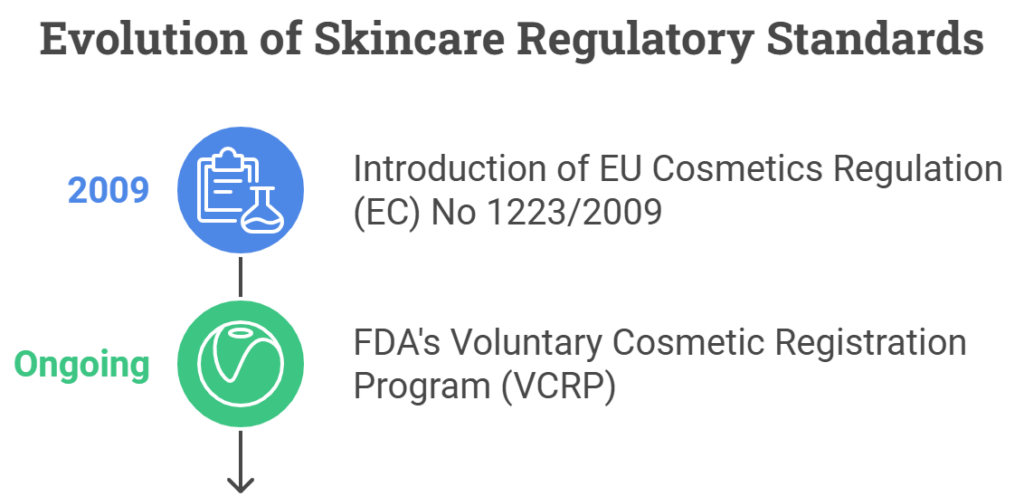How Skincare Manufacturing Evolved Over Decades
In the bustling corridors of a modern Skincare Facility, shelves gleam with serums, creams, and delicate vials of innovation.
Through strategic advancements and dedicated research, the entire Skincare Manufacturing landscape has transformed. An industry once rooted in simple formulations now thrives on state-of-the-art technology.
The Early Days of Skincare Manufacturing
Long before today’s innovations, Skincare Manufacturing was rooted in basic ingredients and timeless practices. Ancient civilizations relied on nature’s bounty, using herbs, oils, and clay to create effective formulations without modern tools. These early manufacturers possessed an inherent wisdom, understanding the natural synergy that provided rejuvenation and healing.
Across civilizations, knowledge exchange flourished. In ancient Egypt, for instance, they blended aloe vera and honey with fragrant oils, establishing luxurious skincare routines that catered to beauty and well-being. This cross-cultural sharing enriched the evolution of skincare practices.
These innovations, though modest by today’s standards, laid the groundwork for modern skincare. The shift from handcrafted mixtures to organized production systems marked a significant leap, driven by a collaborative spirit and a quest to harness nature for aesthetic and therapeutic benefits.


Innovations in Skincare Formulations
The dawn of modern science heralded an era of radical transformation in skincare formulations. Breakthroughs in chemistry offered unprecedented insights into the skin’s structure.
Companies harnessed these findings, developing products tailored to specific skin types. Personalization became a core aspect of skincare evolution.
This wave of innovation extended to include advances such as retinoids and peptides, which were integrated into formulations to address a multitude of skin concerns. These potent ingredients provided targeted solutions, vastly improving efficacy.
The most recent decades saw the integration of biotechnology in skincare, signifying a colossal shift. Microbiome-friendly products, for instance, emerged as front-runners in the industry, driven by an ambition to nurture the skin’s natural barrier. This symbiotic relationship with skin flora reflects a commitment not merely to appearance but to holistic health and resilience. As technology advances, expect this trend to evolve continually, bringing groundbreaking discoveries to our skincare regimen.
The Role of Technology in Skincare Production
In the dynamic world of skincare manufacturing, technology drives transformative progress and sustainable innovation. Since 2016, advancements like machine learning have revolutionized product development, enabling companies to analyze consumer data and predict trends with precision, resulting in more effective formulations.
Bioscience innovations are unlocking new possibilities, offering revolutionary treatments powered by scientific insights. Real-time KPI tracking and AI-driven analytics enhance production cycles, ensuring each product embodies efficiency, quality, and cutting-edge research.
As technology advances, it promises not only improved efficacy but also eco-friendly production methods.
Regulatory Changes Over Decades
Through the evolution of skincare manufacturing, rigorous regulatory standards have played a pivotal role in shaping a culture of compliance and safety, illustrating how Skincare Manufacturing evolved over decades. This commitment to safeguarding consumer health has been instrumental in fostering trust and reliability in skincare products worldwide. Regulatory bodies such as the U.S. Food and Drug Administration (FDA) and the European Medicines Agency (EMA) have been at the forefront, continually refining measures to elevate quality benchmarks. These organizations ensure that products meet stringent safety and efficacy criteria before reaching the market, thereby protecting consumers from potential harm.
Over the decades, significant regulatory changes have been implemented to adapt to the ever-evolving landscape of skincare manufacturing. For instance, the introduction of the EU Cosmetics Regulation (EC) No 1223/2009 marked a major shift in ensuring product safety within the European Union.
This regulation mandates comprehensive safety assessments and prohibits the use of certain harmful substances, setting a high standard for manufacturers.Similarly, the FDA’s Voluntary Cosmetic Registration Program (VCRP) encourages manufacturers to register their products and ingredients, promoting transparency and accountability in the industry.

These regulatory enhancements signify a robust global commitment to safety and efficacy, which is vital for maintaining consumer confidence. As the skincare industry continues to innovate, regulatory bodies remain vigilant, adapting their frameworks to address new challenges and technologies. This ongoing dedication to rigorous standards not only protects consumers but also drives the industry towards sustainable and ethical practices, ensuring that skincare products are both safe and effective for all.
Impact of FDA Guidelines on Skincare
The FDA has played a pivotal role in shaping the skincare industry, ensuring safe and effective products for consumers. Their guidelines have set high standards that manufacturers must adhere to.
As regulations evolved, manufacturers started to focus more on “clean beauty.” This has led to a surge in transparency and mindful ingredient selection, elevating overall product quality and consumer safety.
- The FDA ensures skincare products meet safety standards, enhancing consumer trust and industry innovation.
Industry leaders have embraced these guidelines as opportunities for innovation, striving for excellence beyond compliance. Consequently, the market has seen an influx of scientifically validated and consumer-trusted skincare offerings. This evolution marks a progressive shift towards more efficacious and responsible product lines, establishing a resilient foundation for the future of skincare.
Shifts in Consumer Preferences
Over the past few decades, as consumer preferences for skincare have undergone a remarkable transformation, we can see how skincare manufacturing evolved over decades, steering the industry towards unprecedented horizons.
In the 1980s, consumers primarily sought products that offered quick fixes, often prioritising aesthetics over ingredients. However, with the advent of the information era, consumers became more discerning, focusing not just on results but also on the safety and sustainability of their skincare choices.
Today, it’s not merely about how one’s skin looks but rather the skin’s intrinsic health. This paradigm shift has inspired a demand for products imbued with natural ingredients and bolstered by scientific innovation, providing timeless beauty and skin wellness.
Technology and the internet have empowered consumers, enabling them to make informed decisions. The skincare industry has adapted, embracing transparent practices and developing advanced formulations, integrating consumer feedback to craft products that resonate with personal values and aspirations.
This evolution reflects a greater societal shift towards wellness and authenticity, challenging the industry to continuously innovate.
Sustainable Practices in Modern Skincare
The skincare industry has embraced eco-conscious measures, prioritising sustainable practices in manufacturing and ingredient sourcing.
In recent years, these brands have dynamically incorporated eco-friendly initiatives (e.g., reducing water usage) to mitigate environmental impact, reflecting a commitment to protecting nature while delivering efficiency.
Terms like “carbon-neutral” and “zero-waste” now mirror aspirations to redefine the ‘beauty landscape’.
Eco-friendly Ingredients and Packaging
Eco-friendly ingredients have revolutionized skincare production by incorporating sustainable materials like algae extracts, bamboo, and hemp fibers. This shift towards ethically sourced, renewable ingredients not only preserves natural resources but also enhances product efficacy. The industry has also embraced biodegradable packaging, using compostable materials such as corn-based plastics and mushroom-derived leather, significantly reducing the carbon footprint.
This commitment to environmental sustainability reflects a profound transformation, as companies adopt pioneering technologies and innovative partnerships to minimize waste. As of 2023, the skincare industry continues to champion eco-conscious practices, balancing luxury with planet preservation and inspiring confidence in a greener future.

Rise of Organic and Natural Skincare Products
In recent decades, the Skincare Industry has embraced a holistic approach, emphasizing organic and natural products. Informed consumers now demand transparency and naturally sourced ingredients, driven by growing environmental awareness and a preference for purity in personal care.
Organic skincare lines, prioritizing well-being, have become prevalent, blending innovation with tradition through certified organic ingredients. These products promise both external radiance and internal peace, aligning with holistic living.
Scientific research supports the efficacy of organic products, fostering widespread acceptance and a universal trend toward sustainable beauty. As science and nature converge, skincare becomes a celebration of the planet’s generosity, inviting trust and longevity.

The Influence of Digital Marketing
Digital Marketing has fundamentally redefined how Skincare brands connect with consumers. This transformative platform enables brands to reach vast audiences with precision, tailoring messages to enhance engagement and foster loyalty. Digital tools facilitate personalized skincare routines, offering consumers bespoke solutions.
Social media platforms play a pivotal role, with influencers and bloggers providing real-time reviews that are easily accessible. This interactive landscape strengthens brand-consumer relationships and encourages innovative communication.
As we navigate the dynamic landscape of 2025, digital marketing’s significance continues to grow. Each campaign invigorates the industry, turning challenges into opportunities and highlighting the synergy between technology and skincare, underscoring its immense potential.
Customization in Skincare Solutions
In recent years, Skincare Manufacturers, driven by advances in personalization technology, have reached new heights. Customization caters to the unique skin requirements, allowing consumers to procure products tailored to their specific concerns, thus elevating user satisfaction and enhancing the overall experience.
As algorithms and analytics gain a firmer foothold, solutions such as “bespoke serums” are now a staple of a discerning routine, resonating deeply with tech-savvy consumers. From DNA analysis to lifestyle inputs, personalization in skincare ensures that each product is as unique as the individual, promising a future where skincare is not just a routine but a personalized daily delight.
Personalised Skincare Regimens
In the ever-evolving Skincare landscape, personalized regimens have become a game-changer, thanks to advanced data analytics and biotechnology. Since 2016, innovations like Lumini Skincare’s AI-driven analysis system have enabled precise bespoke formulations, incorporating genetic and environmental insights.
Today, personalized skincare goes beyond surface treatments, with products tailored to specific climates and individual needs. Machine learning further enhances this by curating products for individuals, merging technology with personal care for unparalleled efficacy.
These personalized regimens empower consumers with potent, targeted solutions that align with their unique lifestyles.
The Future of Skincare Manufacturing
As we step into the future of skincare manufacturing, new technologies promise a transformative shift in product development, reflecting the blueprint for a skincare brand launch. Advanced biotechnology enables manufacturers to tailor solutions with unprecedented precision, using genome mapping, predictive analytics, and nanotechnology.
These advancements optimize production processes, accelerating development cycles and delivering innovative solutions swiftly. Established brands enhance their offerings with scientifically backed results, fostering an ecosystem of integrated, ethical, and sustainable skincare solutions.
We stand on the cusp of a future rich in possibilities, where innovation continues to propel the skincare industry toward unprecedented frontiers.

Notable Clients









